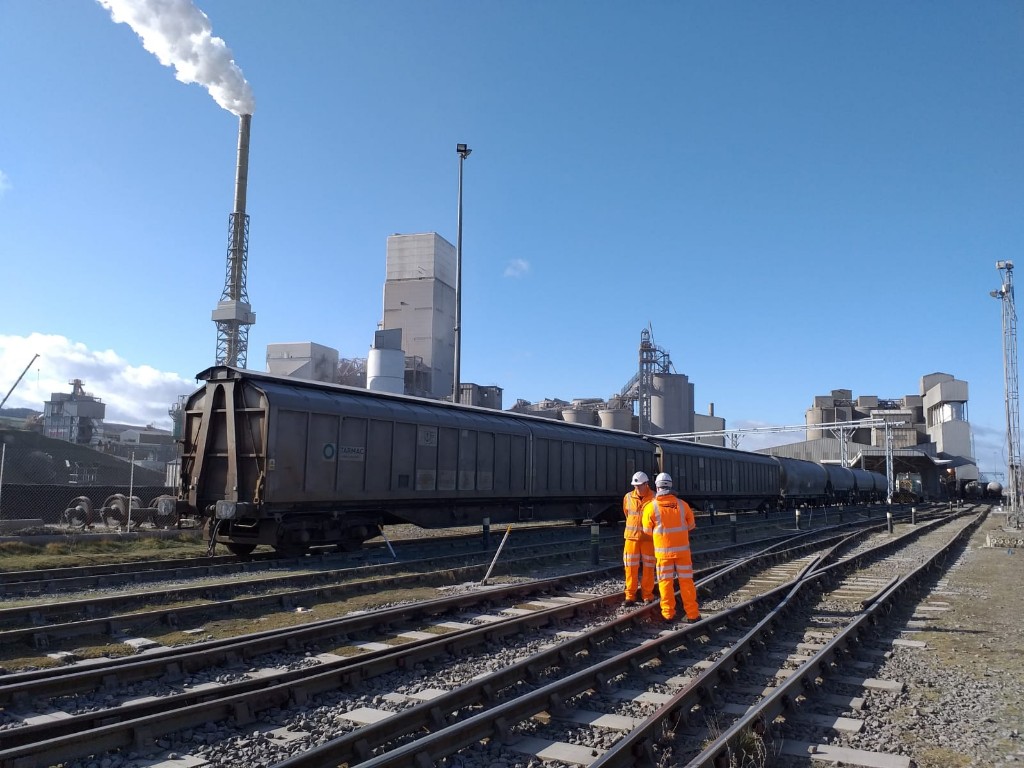‘Unlocking the potential for rail freight within the construction sector is up to the industry’

As the Head of Rail for Tarmac, Chris Swan is committed to strengthening further the relationship between industry and the railways. His company may have a name that is synonymous with road construction in its home market. However, in its wider remit as a sustainable buildings and construction materials provider, Tarmac is in the ideal position to unlock all the advantages of rail for delivering the prodigious quantities required for regional and national infrastructure projects.
At home in the UK, Chris Swan’s company Tarmac has been recognised as an innovator in its sector. It’s also regarded as a company that goes out of its way to share knowledge. That desire to share has encouraged Swan to join the keynote speakers at the forthcoming RailFreight Summit Poland on 19-20 April in Warsaw.
Swan’s topic – Unlocking the potential for rail freight within the construction sector – is set to outline the collaborative approach adopted by Tarmac, designed to further its contribution to developing a sustainable built environment. Swan has just returned to the UK after a tour of facilities in mainland Europe. He intends to share those experiences, and more, with his audience in Warsaw.
Rail freight is primary to operations
The rail freight industry has recognised Tarmac in the UK. It has won the Business of the Year award from the Rail Freight Group, the representative association which includes many of the company’s peers among its membership. That award, usually the preserve of the rail industry supply side, was a recognition of the commitment demonstrated by Tarmac towards the growth and expansion of rail freight as a key part of the company’s operations.

Having played a leading role for around two decades, it is no surprise that, since the award, Chris Swan has been in demand, and his forthcoming appearance in Warsaw is keenly anticipated. His personal stock has been rising too. Last year, he was appointed as chair of the Rail Freight Group where, in typically modest terms, he expressed pleasure at being able to support the work of the board and members in promoting the interests of the sector. Those interests are compatible not only with those of Tarmac, but with the wider economy of the UK.
Rail freight can continue to deliver
Sustainability is something permanently on the agenda for Swan. “With so much uncertainty in the economy and wider rail sector, it is crucial we continue to make the case for our industry”, he explains. “There are many advantages that rail freight can continue to deliver for the country, including the critical role of moving towards a net-zero economy. That’s something that I feel is vital for our industry. It’s also something that governments are mandating, with legislation that makes sustainable, net zero carbon operations an imperative. It’s not just desirable for Tarmac and the rest of the economy. It is important that we embrace sustainability into our culture.”
The level of rail freight activity within Tarmac operations may give the casual observer the impression that the company has already fully embraced rail into its daily operations. Chris Swan, however, says that the job of integration is a continual process of review and improvements. “We’re always keen to explore new ways of innovating rail freight”, he says. “We are committed to designing out CO2 from our supply chain and the manufacture and transport of our products. The nature of our business drives the infrastructure development of the country at large, and we have a clear focus on playing our part in delivering carbon neutrality along our value chains to support the UK’s net zero target.”
New avenues in decarbonisation, automation and digitalisation
The wealth of experience accrued by Tarmac is an investment which is available for the development of industry as a whole. Tarmac collaborates with the Rail Forum SME Challenge (Small and Medium sized Enterprises), alongside a panel of leading rail freight businesses. Swan is behind the initiative, to help discover creative ideas from inside and outside of the sector, and to help develop UK rail terminals of tomorrow. “We are proud to be part of such an exciting initiative”, he said. “Collaboration is an important part of our culture. It opens up communication between ourselves and new entrepreneurs, with new ideas. Sharing knowledge through initiatives like this works as a valuable resource for both the SME community and Tarmac alike. Collaborations can help us consider new avenues in decarbonisation, automation and digitalisation.”

“Rail freight is without doubt, the environmental and economic advantage for the future”, says Swan. “It is up to the industry to unlock the potential for rail freight within the construction sector, by driving towards ambitious net zero targets, which give rail a generational opportunity to provide solutions in the short term. Grasping this opportunity will ensure that rail freight offers high quality and competitive service and prices so that the modal switch is sustainable.”
RailFreight Summit Poland
Registration is open for the RailFreight Summit. Industry partners from across Europe, and globally, are welcomed to attend the event, which features Chris Swan and a host of industry leaders. Join them for the Summit, the grand delegate dinner and a special added incentive. A limited number of delegates can take part in a unique, full day, guided visit to the Malaszewicze rail freight terminal near Warsaw, a huge site, and a leader in rail freight handling innovation. For further details and registration follow this link.





Indeed, yes! Industry has to provide!
In fact, Industry is responsible.
We have got “facit”.
Modes, at transports, proving redundant and resilient, handsomely are rewarded, by willingly paying clients – and vice versa…
Railways have to out old standards, now bottlenecks!
• A redundant electrification is a must!
• Same, at Railway, basics, the infrastructure! (Not sustainable, just longer trains is single option for added load, etc., etc.)
Quality pays and at transports, in particular!